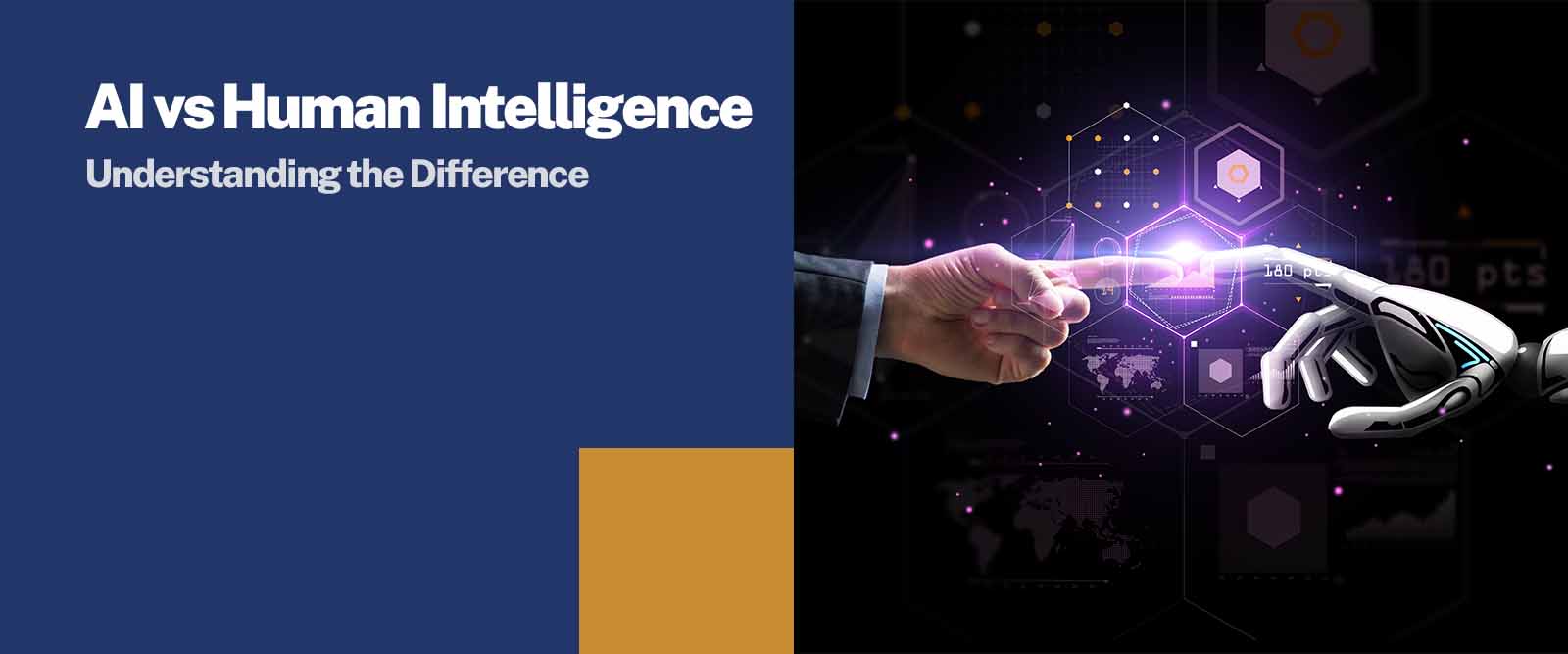5800 students unlocked their dream jobs with UG/PG programs in top colleges. Apply Now!
Artificial Intelligence (AI) has become a hot topic of debate of AI vs Human Intelligence in recent years, with some believing that AI could one day replace human intelligence and even surpass it. The emergence of Artificial Intelligence (AI) has led to many discussions and debates about its impact on human intelligence and the future of work. Some experts argue that AI has the potential to surpass human intelligence in many areas, while others believe that human intelligence is unique and cannot be replicated by machines.
One of the main advantages of AI is its ability to process vast amounts of data and perform complex tasks quickly and accurately. This has led to many applications in finance, healthcare, and transportation. Pursuing a career in artificial intelligence (AI) can be a great choice, as the demand for AI professionals is constantly increasing in many industries. One can apply for an MCA degree in AI to gain higher. However, there are also concerns about the impact of AI on the job market and the economy. As AI becomes more advanced, some jobs may become automated, leading to job losses and economic disruption. Despite these concerns, many experts believe that AI and human intelligence can coexist and complement each other.
What is Artificial Intelligence?
Here are a few points summarising what artificial intelligence is:
- Artificial intelligence is a branch of data science that focuses on building intelligent machines capable of performing tasks that typically require human intelligence and cognition.
- Machine learning is one of the most important subsets of AI, which involves using algorithms to analyze data and learn from it without being explicitly programmed. These machines are typically designed to perform specific tasks, such as recognizing speech, playing games, or navigating a physical environment.
- AI research draws on a wide range of fields, including computer science, psychology, philosophy, neuroscience, cognitive science, linguistics, operations research, economics, control theory, probability, optimization, and logic. Researchers in these fields collaborate to develop algorithms and models that enable machines to learn from data, reason about complex problems, and make decisions.
- AI research also overlaps with tasks such as robotics, control systems, scheduling, data mining, logistics, speech recognition, facial recognition, and many others. These applications rely on AI techniques such as machine learning, natural language processing, computer vision, and expert systems, among others.
- AI research is a highly interdisciplinary field that draws on many tools and insights to develop intelligent agents and systems that can solve complex problems and improve human capabilities in many areas.
What is Human Intelligence?
Below are the points that summarise human intelligence:
- Human intelligence refers to the cognitive ability of human beings to think, reason, learn, understand, solve problems, and communicate with others. It is a complex and multifaceted concept, and it includes the ability to recognize patterns, retain information, and make inferences and decisions based on that information.
- What sets human intelligence apart from other forms of intelligence is the abstract emotional component that accompanies it.
- Human intelligence is also highly adaptable and can change depending on the context and the problems that arise within it.
- Humans have the ability to adapt to new situations, acquire new skills and knowledge, and change their behavior based on their environment and circumstances. This adaptability is one of the hallmarks of human intelligence and is what has allowed humans to thrive and succeed in a constantly changing world.
- In some cases, human intelligence is used to gather sensitive or confidential information that may be of strategic importance to governments or other organizations. This can involve the use of spies or other forms to gather information from sources that may be difficult to access through other means.
Difference between Artificial Intelligence and Human Intelligence:
The following table compares human intelligence and artificial intelligence:
Factors |
Artificial Intelligence |
Human Intelligence |
Emergence |
Wiener's work on feedback and control mechanisms in machines provided a theoretical basis for the development of AI and machine learning algorithms. |
Human beings are naturally endowed with cognitive abilities such as thinking, reasoning, analyzing, and evaluating. |
Nature |
Artificial intelligence (AI) is a field of computer science that focuses on the development of algorithms and systems that can perform tasks that normally require human intelligence, such as visual perception, speech recognition, decision-making, and natural language understanding. |
Human intelligence is the ability to learn, reason, problem-solve, and adapt to new situations through a combination of cognitive processes. These processes include perception, attention, memory, language, and executive functions such as planning, decision-making, and problem-solving. |
State |
Machines, including those that utilize artificial intelligence, are digital in nature. They operate using binary code, which is a series of 0s and 1s that computers use to represent and process information. |
The human brain is often compared to an analog computer in the sense that it is able to process information in a continuous and non-linear fashion, rather than the digital processing used by machines. |
Function |
AI-powered machines rely on the input of data and instructions, also known as training data and algorithms, to perform their tasks. |
Humans use their cognitive abilities to understand and interpret the world around them, communicate with others, and make decisions based on their experiences and knowledge. |
Learning Ability |
While AI-powered machines can perform complex tasks and analyze data at a much faster rate than humans, they lack the ability to reason abstractly, think creatively, or make connections between seemingly unrelated ideas. |
Humans have the ability to learn from their past experiences and adjust their behavior accordingly. This is a key aspect of human intelligence that allows us to adapt to new situations, solve problems, and make decisions based on previous knowledge and experience. |
AI and human usage rates |
One of the major advantages of computers and AI is their ability to process vast amounts of data and perform complex calculations at incredibly fast speeds. |
In terms of raw processing speed and the ability to handle large volumes of data, AI, and machines are typically faster than humans. |
Decision making |
AI can indeed be objective in decision-making because it relies on data and algorithms to analyze and make choices. |
Human decision-making is influenced by a variety of factors. These subjective elements can play a significant role in decision-making, even when there is an abundance of data available. |
Versatility |
It is true that AI can only perform a limited number of tasks simultaneously, it is important to note that AI can also perform these tasks much faster and more efficiently than humans. |
On the other hand, humans do possess the ability to multitask and perform a variety of different tasks at the same time, though they may not always do so with the same level of efficiency or accuracy as AI in certain contexts. |
Social Networking |
AI has made significant progress in natural language processing and speech recognition, it still has difficulty understanding the nuances of social and emotional cues, which are essential for effective human interaction. |
Humans have the ability to process complex social and emotional information, interpret nonverbal communication, and respond appropriately to social situations, which is currently beyond the capabilities of AI. |
Task |
AI is programmed to optimize a given task or system based on a set of rules or algorithms. |
Human intelligence has the capacity for creativity and innovation beyond the limitations of programming. |
MCA in Artificial Intelligence
- MCA in Artificial Intelligence refers to a postgraduate degree program that focuses on the study of artificial intelligence, machine learning, data analytics, and related fields.
- MCA degree stands for Master of Computer Applications, and it is a three-year program designed to equip students with the skills and knowledge necessary to develop, implement, and maintain AI-based solutions.
- The program covers a wide range of topics, including programming languages, algorithms, data structures, database management, operating systems, and computer networks.
- The eligibility requirements for admission to MCA may vary depending on the university or institution offering the program. However, the general eligibility criteria may include:
- Candidate should have completed a bachelor's degree in Computer Science/Information Technology/ Mathematics/Statistics or a related field.
- The minimum aggregate score in the bachelor's degree should be at least 50%.
- Candidates should have studied Mathematics as a subject in their 10+2 or graduation.
- A career in artificial intelligence (AI) is a promising field, with the potential for growth and advancement. The program prepares graduates for a range of careers in the field of AI, including data scientists, machine learning engineers, AI researchers, and software developers.
Role of Artificial Intelligence in the Human World
- One of the most significant impacts of AI is the automation of tasks that were previously performed manually. AI has the ability to process and analyze large amounts of data quickly and accurately, which makes it well-suited for tasks that involve repetitive or data-intensive work.
- While the adoption of AI and automation may displace some jobs, it can also create new opportunities and careers. As AI and automation continue to evolve and become more sophisticated, they are also creating new fields of study and work that require specialized knowledge and skills.
- The adoption of AI can create new opportunities for entrepreneurship and innovation, as individuals and small businesses can leverage AI-powered tools and services to compete with larger organizations.
- When AI is put to good use, it has the potential to increase productivity and collaboration within companies, leading to improved efficiency, new revenue streams, and economic growth.
- The automation of mundane and physical tasks can free up time for experts and professionals to focus on higher-level tasks that require human creativity, problem-solving, and critical thinking.
Conclusion
Regarding the impact of AI on society and the workforce, it is true that AI is already transforming many industries and will continue to do so in the future. However, AI is not likely to completely replace the need for human workers, as there are many tasks that still require human expertise and creativity. Instead, AI will increase human abilities and lead to the evolution of new skill sets and job opportunities.
One can even pursue a career in Artificial intelligence, which offers a vast range of job opportunities in various industries. Sunstone will help you to build your skills with diverse course options at a campus that provides Sunstone's perks. We work to create your professional portfolio that will increase the chances of your placement by 200%.
FAQ - Human Intelligence vs Artificial Intelligence
Are humans more intelligent than AI?
The question of whether humans are more intelligent than AI is complex and multifaceted, as it depends on how we define and measure intelligence. In some areas, AI has surpassed human performance, such as in complex calculations, data processing, and certain types of pattern recognition. However, AI still struggles with tasks that come naturally to humans, such as common sense reasoning, creativity, emotional intelligence, and understanding context and nuance in language.
What will be the salary after MCA in Artificial Intelligence?
In India, the average yearly income for an entry-level AI engineer is around 8 lakhs, which is much more than the yearly salary of an ordinary engineering graduate. The salary of an AI engineer at high-level roles can reach 50 lakhs.
HELP
Take the first step towards your dream job.
ABOUT THE AUTHOR


